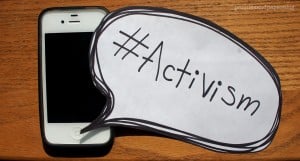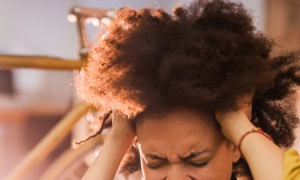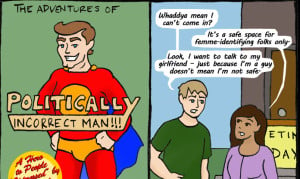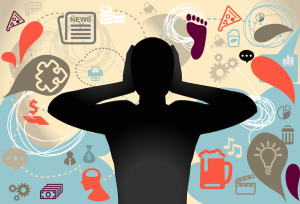Anti-Blackness exists in every continent. It exists among all of our non-Black communities of color; it exists among the people in our families; and it exists among us, individually, too.
Which means it’s our responsibility to continually fight to end anti-Blackness in every way we can.
Among non-Black people of color, there is the widespread notion that racial justice means being united against white supremacy. Yet, non-Black people of color rarely address the question of how the abolition of white supremacy can never be realized if rampant anti-Blackness among non-Black people goes unchecked.
Time and again, Asian American social justice warriors will readily fight white supremacy but in the same breath reinforce anti-Black tropes or appropriate Black American cultures.
To live in the world that Black, Indigenous, and other people of color dream about requires a complete stop, utter end, total destruction of anti-Blackness.
And I say this not as someone who has unlearned anti-Blackness but is unlearning, with the knowledge that the end of my oppression is bound up with Black liberation and with the knowledge that Black folks deserve unconditional freedom regardless.
There is no quick-and-easy microwaveable version of unlearning anti-Blackness. It is a lifelong, necessary commitment.
Here are some things I’ve noticed while unlearning.
1. Non-Black Asians Create Distance from Blackness
One of the ways that we Asian Americans attempt to show that we are valuable under the Euro-American gaze is by distancing ourselves from what we perceive to be Blackness – meaning we draw ourselves in stark contrast to the narrow stereotypes that non-Black people have already assigned to Black people.
In the context of the beauty industry, this results in non-Black folks finding ways to bleach our skin, color our eyes and hair, and do our makeup in ways that not only reaches towards whiteness but also distances us from Blackness.
For Asian Americans, the lighter the skin, the more beautiful you perceived to be. And across the Asian continent, lighter skin is a mark of beauty, while darkness is equated to ugliness. Girls, especially, have their bodies policed to make sure they conform to anti-Black ideas of beauty.
As for income, Asian Americans often struggle to attain financial and political wealth in order to move out of poor, Black neighborhoods and prove to white people that we are not “like the Black folks.”
As a result, we willfully buy into the “model minority myth,” which is the puke-inducing idea that Asian Americans are the good, hardworking example of what a minority should be.
The term was coined by sociologist William Petersen in 1966 to describe the success of Japanese Americans in the face of anti-Japanese sentiment.
Despite the fact that he was only describing a single ethnicity out of the many ethnicities in Asia – go read a map to remind yourself of how fucking big Asia is – people then began using the term to refer to Asian Americans as a whole.
Yeah, people started using this model minority myth while talking about all immigrants from the entire continent of Asia – that shit was ridiculous to say the least.
This myth only holds true if Asian Americans are willing to maintain that Black folks are a “bad minority.” The assigned value of non-Black Asian Americans is entirely dependent on the lack of value they assign to Blackness.
But the truth is that in 2015, many communities of Asian Americans have begun to access the privileges that have been traditionally associated with white Americans.
The danger is in saying that Asian Americans, as a whole, are a successful minority by capitalist standards, because there are many Southeast Asians, for example, disproportionately living in poverty and with mental illness.
There are many undocumented Asians, too, who are not even taken into account in the rare cases that Asian Americans are even included in race-oriented surveys. There are also South and West Asians who are being victimized by the onslaught of Islamophobic hatred.
The thing is that this model minority myth did not consider at all that Black Asians exist, and that Black Asians are facing the inconceivable violence of anti-Blackness, too. The colonial imposition of racial categories was not made to uphold the complexities of bodies and identities.
Where do Black Asians fit in the context of anti-Blackness and a model minority?
2. Black Asians Exist and They Will Not Be Erased
The most dangerous way that non-Black Asians distance ourselves from Blackness is by conceptualizing the Asian American as completely devoid of Blackness.
When people hear “Asian,” the majority immediately think of a pale-skinned person with straight, black hair – someone who looks like Lucy Liu. The image that Asians and non-Asians have in their heads about who Asians are is not just woefully monolithic, but also removed from Blackness.
When Asian identity – how Asians understand ourselves in relation to the world as racialized people – makes no room for Blackness, it results in the violent erasure of Black Asians from the face of the earth.
If Black Asians aren’t known to exist, there is no consideration for the violence they face. There is no consideration to the multiplicities of Blackness that are reduced by non-Black folks.
When Black Asians are erased, non-Black Asians have an easier time creating distance between ourselves and Blackness, gaining illusory value at the expense of Black people.
One of the functions of white supremacy and anti-Blackness is to simplify the histories, ancestries, and identities of Black, Indigenous, and other people of color.
This is why many people don’t know about Blackness in Asia and among the diaspora. It’s much more convenient to believe that Blackness has no place in Asian identity in order to more easily participate in the capitalist dynamics of whiteness.
As a result, misinformed accusations of cultural appropriation, for example, ensue. South Asians have accused East Africans of appropriation for wearing headpieces, henna, and jewelry that are commonly associated with South Asians.
Despite being separated only by the Indian Ocean, the ties that connect South Asians and East Africans are strained by non-Black Asians’ inclination to set the terms and conditions of how they want to use Blackness.
All ties to Blackness are erased when non-Black Asians feel the need to monopolize our cultures, but there is no hesitation when non-Black Asians across the world want to appropriate Black American cultures.
What space can Black Asians find in Asian communities when Blackness is unwanted and mistreated yet simultaneously stolen and parodied?
How can Black Asians, and Black folks as a whole, feel safe with non-Black Asians when the perpetrator of the Charleston massacre wrote on his website that East Asians “are by nature very racist and could be great allies of the White race?”
Dear non-Black Asians, it has long been time to shift our priorities.
3. Getting Our Social Justice Priorities Right
When the Black Lives Matter movement was beginning to be derailed by those who were using #AsianLivesMatter, it was clear that these non-Black Asians didn’t realize that Black Asians exist too and that if they actually gave a fuck about Asian people at all, they would support Black Asians and Black Lives Matter.
But aside from that self-serving reason, the derailing of Black Lives Matter also hurts non-Black Asians because white supremacy relies on anti-Blackness to survive. A white supremacist world is not sustainable without anti-Blackness fueling it.
And because white supremacy, and oppressive systems in general, rely on erasure, non-Black Asians forget that before Europeans started the Atlantic slave trade, there was the Arab slave trade of East Africans.
Grappling with our anti-Blackness as Asian Americans has to take place both within and outside of a white supremacist context, because non-Black people committing anti-Blackness predates European anti-Blackness.
This is not to say that non-Black Asians are more responsible than Europeans for anti-Blackness; rather, I am pointing out the fact that non-Black Asians certainly did not need white people to instruct them on how to be anti-Black.
Claiming that anti-Blackness is a result of white conditioning is shirking responsibility.
White supremacist politics of erasure makes us forget that the crux of white supremacy is anti-Blackness. When we forget this, and proceed to be anti-Black, we only support the white supremacist structure that we long to destroy.
My call to action for my fellow non-Black Asians is to re-envision our place in racial justice. Rather than simply claiming allyship to Black justice movements we need to understand that Black liberation is crucial to any foreseeable future for racial justice, which means it is our duty to contribute to Black liberation too.
White supremacy will never end if non-Black people of color continue, whether consciously or not, to uphold white supremacy by hurting Black folks.
It’s time to stop believing that we’ll be safe by accessing some white privileges. We need to be vigilant and understand that the settler state called America, founded on stolen Indigenous territories, will never be here to benefit us.
Remember when the government decided that they would be more blatant with their racism and rounded up tens of thousands of Japanese American families to incarcerate them?
The United States could do the exact same thing again to South Asian and Arab Americans as Islamophobia grows, and it’ll again be for “national security.”
The Southeast Asian refugees who thought they could find safety in America are being deported once again. As we speak, the imperialist American military is wreaking havoc all across Asia, resulting in the deaths of marginalized people like our trans sister Jennifer Laude, a Filipina trans woman killed at 26 by a US Marine.
Reaping the benefits of white supremacy may be appealing, but it is ultimately poisonous. Fighting anti-Blackness gets everyone closer to real justice.
How We Can Create the World We Deserve
Many of the structures that harm Asian Americans, like law enforcement, the prison system, and the military industry, harm Black folks the most, and that includes Black Asians.
The efforts of Black Lives Matter, in resisting structures that harm us, will benefit all people of color, whether that’s intended or not. Among Asian communities, Black Lives Matter will benefit both Black Asians and non-Black Asians. But we can’t expect Black folks to do all of the work for non-Black people.
We can’t let justice be achieved off the backs of Black people. To ask Black activists and organizers to do all of the work is in itself anti-Black.
This is everyone’s battle.
Beyond supporting Black Lives Matter because of how the movement helps us, let’s support Black Lives Matter simply because Black Lives Matter and the whole damn world needs to know.
We need to reframe our discussions around racial justice and recognize that ending anti-Blackness should be a top priority. Whether we’re committed to Black liberation, the end of anti-Asian oppression, the abolition of white supremacy, or the possibility of a better world at all, we need to prioritize ending anti-Blackness.
Now what does that mean? It means centering Black people in our racial justice struggles.
It means unconditionally demanding justice for Akai Gurley, who was murdered by Peter Liang of the NYPD. It means centering Black Asians in any and all discussions about Asian identity, since Black Asians would largely be the most victimized of all Asians. And it means redistributing financial, political, and emotional resources to Black folks, especially Black femmes.
Ultimately, it can mean the abolition of anti-Black structures like police and prisons, and the decolonization of land owned by anti-Black settler colonial governments.
I know that these are some hefty goals, maybe goals that you haven’t dreamed of yet. But I believe that we will win. And sooner than you think.
[do_widget id=’text-101′]
xoài phạm is a Contributing Writer for Everyday Feminism. They are a Vietnamese femme. They are tender and dangerous. They love mangos. They have places to be and people to scare. Read their articles here.
Search our 3000+ articles!
Read our articles about:
Our online racial justice training
Used by hundreds of universities, non-profits, and businesses.
Click to learn more





















